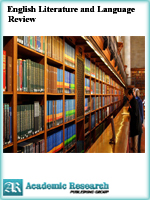English Literature and Language Review
Online ISSN: 2412-1703
Print ISSN: 2413-8827
Print ISSN: 2413-8827
Quarterly Published (4 Issues Per Year)

Archives
Volume 5 Number 7 July 2019
The Role of Reflective Teaching for Continuing Professional Development of English Teachers
Authors: Li Qingyun
Pages: 123-133
DOI: doi.org/10.32861/ellr.57.123.133
Abstract
Reflective teaching is a relatively important issue in the field of teachers’ continue professional development. In this study, the author reviewed previous studies that investigated reflective teaching had positive influence for teachers’ progress in the long run. There were 13 different experiments analyzed in this article. Through a series analysis, five positive impact factors of reflective teaching were extracted: (a) Reflective teaching is correlated with the coefficient of the teacher’s CPD, (b) Teachers using reflective teaching will enhance teaching energy and confidence, (c) Teaching journal writing causes positive effects on the promotion of teaching quality, responsibility and consciousness, (d) Positive reflection attitude, academic qualifications and the overseas study experience promote the efficiency of teacher’s CPD, and (e) Based on group reflective discussions, teachers have more enthusiasm to share their thinking and get some new and creative teaching methods. Whereas, this study also showed that lack of theoretical knowledge restricts the teacher’s autonomous reflection ability. In addition, the researcher pointed three implications are used for teaching in class. Firstly, the reflective consciousness should be cultivated. Secondly, teachers need to focus on the combination of reflection theory and teaching practice. Thirdly, school and society should supply training activities and relax the environment for English teachers to enhance the quality of their reflection.
Improving Students’ Mastery of Vocabulary Through Flip Book Approach
Authors: Sarala Thulasi Palpanadan ; Asliaty Atim ; Zulida Abdul Kair ; Venosha K.Ravana ; Muhammad Aiman Mohammad
Pages: 117-122
DOI: doi.org/10.32861/ellr.57.117.122
Abstract
Many students find it hard to acquire and convey messages due to the lack of mastery in vocabulary. Since vocabulary plays a major role as the basic requirement to learning a language, its mastery became vital in learning English. On the other hand, lack of vocabulary impedes students’ understanding in reading comprehension texts especially in second language classrooms. Therefore, this study was conducted in order to obtain information regarding the effectiveness of using flip book in increasing Year 3 pupils’ mastery of vocabulary in English. This study investigated the use of flip book approach in helping the students to improve vocabulary through fun and meaningful learning. 15 participants were involved in the action research who were selected from a suburban school in Malaysia. Survey, written documents and field notes were used as the medium of data collection. The results showed significant positive changes in the performance of the students from time to time. Flip book approach was found to help the weak students who faced problems in understanding the meaning of the vocabulary taught in the classrooms. This study suggests that students need to enhance the mastery of the vocabulary in order to have a good grasp of the language including the four skills: listening, speaking, reading and writing.



